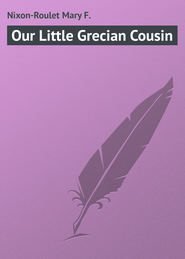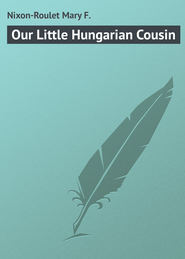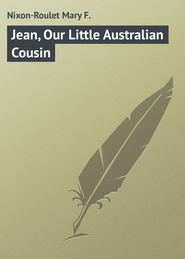По всем вопросам обращайтесь на: info@litportal.ru
(©) 2003-2024.
✖
Jean, Our Little Australian Cousin
Настройки чтения
Размер шрифта
Высота строк
Поля
"It might be best," Mrs. Hume said thoughtfully. "I will talk it over with Fergus and leave Jean in your care, going with him, if he agrees."
Mr. Hume, however, had very decided ideas as to what was best to be done.
"Since your sister and her husband are so anxious to keep you, my dear, I am sure it will be best for you and Jean to stay here at the run. My trip to the Gold Fields is only an experiment. It will be a long, hard journey and an expensive one, and I may not find anything worth doing when I get there, and in that case will return and take up stock farming. McDonald offers me a chance now, but I feel as though I ought to make the trial before accepting help.
"I will take Fergus with me. The trip will not hurt him and he would drive you distracted if left here with Sandy. I shall do better work feeling that you and the lassie are safe and well cared for here."
"I hate to have you go without me, but I must do as you think best," said his wife. So it was arranged, and with a heavy heart Jean saw her father and brother drive away from the run, starting on their long trip to the Gold Fields.
"Why does father have to go away?" she asked her uncle, who had taken her before him for a ride on his big, black horse, "The Bruce."
"He has gone to hunt for gold, lassie, so you can have fine clothes to wear," he answered.
"I'd rather have father here and not have fine clothes," she said, her lip quivering. "How do they get gold in fields, Uncle? I didn't know it grew like flowers and grass."
"It doesn't, lassie," he answered. "They just call the place they find it the Gold Fields. It is dug out of the earth, where it is found mixed with sand and stone."
"Well, where are the Gold Fields and who found there was gold there?" asked Jean. She liked her burly uncle, who was always ready to talk to her and who explained everything about the run so pleasantly.
"The Gold Fields extend all over Western Australia," said Mr. McDonald. "Gold was first discovered here in 1823 and people have gone mad with gold fever ever since. The precious metal has been found in Victoria, New South Wales and Queensland, but recently it has been discovered in Western Australia. The miners often strike a good lead and grow very rich, but it is a hard life and especially so in the districts where there is little water. In the old days men often died of thirst, but now they have ways of storing the rain which falls in the wet season so that they do not suffer much.
"There are many interesting things about the gold regions if the life there is hard. Trains of camels carry the swag of the miners across the sandy deserts. These beasts were imported especially for this work, since they can go longer without water than any other animals, and often it is a long ways from one good water hole to another. The miners 'peg out' their claims in the new places and set to work sifting the sands in which are found the grains of gold, sometimes as large as nuts. Soon there is a camp started. Little canvas huts dot the country. Then if the camp proves successful, houses are built and finally a city will grow up, almost as if by magic. One city, that of Ballarat, has grown in twenty-five years to be one of the handsomest in Australia. It has broad streets, fine houses, and a beautiful park. The swamp land near by has been made into a lake surrounded by velvet-turfed pleasure grounds, planted with wonderful trees and flowers. Kalgoorlie, in only ten years, is almost a golden city, to which water is brought two hundred miles in pipes, to drive the engines which extract the gold from the quartz."
"Thank you, Uncle, for telling me all about it," said Jeanie. "I hope father will find a good mine and then sell it out quickly and come back to buy a run near you. That is what I should like best of anything."
"So should I, child," her uncle smiled at her. "Here we are at the stables. Jump down and run and call Sandy for me and I'll take you both with me while I go over the sheds."
"I've always wanted to know about these queer looking sheds," said Jean as she and Sandy trudged after her uncle.
"This long building is the wool shed," he said. "Now it is empty and quiet, but when it is shearing time there is noise enough. At this end is the wool press, and the shearing board runs along the sides of the shed. Sheep used to be sheared by hand, but Lord Wesley's brother invented a machine for shearing which is a wonderful thing. Would you two youngsters like to ride around the run with me? I have to go over to the paddocks to-day."
"Oh, Uncle, may I ride?" exclaimed Jean. "I had a little Shetland pony at home and I have missed him so much."
"You may ride Sandy's pony, and he will take Wallace, while I will ride 'The Bruce,'" said Mr. McDonald, and both the children fairly jumped with delight. They rode around the run, the master looking everything over carefully.
"Every paddock has its own flock," he explained to Jean. "In one the ewes are kept, in another the wethers, and then there is a paddock for the horses and another for the cows."
"How do you get so many animals fed," asked Jean.
"They graze on the grass, and those great fields of alfalfa over there are grown to use as food. It has to be irrigated and is quite a little trouble, but it pays in the end. That house is where the manager lives, with his family and the jackaroos."
"What is a jackaroo? Some kind of a bird?" asked Jean. Sandy shouted with laughter and his uncle smiled as he answered,
"No, child, jackaroo is the name given to the young fellows who are new at the station and just learning Australian customs. All kinds of jokes are played on them by the old hands and they have a hard time at first. A story is told of some Englishmen who had just come out and were going hunting. They hadn't found any game and so they asked some station hands if they had seen any. 'There's a jackaroo down near the water hole,' said the cook, wickedly, so the two men hurried away to shoot the strange animal, and lo! it was a young man like themselves."
"What do jackaroos do, Uncle?" asked Jean.
"Well, they have to learn to do all the work there is to do at a station, so that some day they may get to be managers or even run stations of their own. They have to ride the boundary every day to see that there are not holes in the fences, and that the water holes are full. Only one man is needed to look after 7,500 sheep, so he is kept pretty busy."
"There are so many buildings somebody must have to look after them. Do the jackaroos do that?" asked Jean.
"No, all the repair work on the station is given to a set of men who dig water holes, build fences, and do any necessary carpenter work. These draw their groceries, meat, and so forth from the stores, but do not eat at our tables. I don't believe Wu Ling would stand it if he had to cook for them."
"Isn't he funny?" said Jean, laughing. "He lets me come in the kitchen and watch him bake brownie, but he won't allow Fergus or Sandy there at all. Do all stations have Chinese cooks?"
"Not all, but a great many do. The Chinese are the best cooks we can get. A great many people hate the yellow-skinned Celestials and raise a hue and cry about a 'White Australia,' but I don't know what we of the far stations would do without them."
"Wu Ling cooks very good things," said Sandy. "But he got very angry when Fergus called him 'pig tail.'"
"That wasn't nice of Fergus," said Jean. "What beautiful thistles and sweet briar, Uncle."
"Not beautiful in our eyes," said her uncle, as they rode by a magnificent clump of sweet briar, the pink blossoms making a lovely spot of colour against the purple of the thistles. "Some patriotic Scot brought the first thistles to Australia, and an English family the roses, and many's the day I have wished they never came. The soil here is so rich that everything grows fast, and the thorny plants have spread all over the land, in some places growing so thick that they have ruined whole tracts of grazing land. They are nearly as bad as the foxes. These were brought to destroy the rabbits which ate up the crops, but Mr. Reynard likes chicken far better than hare, and he has increased so rapidly that it is almost impossible to get rid of him, though rewards are offered for his scalp and in one year over thirty thousand skins were brought in."
"Do they scalp rabbits, too?" asked Jean.
"Trapping rabbits is a regular Australian business," said her uncle. "A good trapper can make £4 a week catching them, and the fur is used to make felt hats."
"There are lots and lots of interesting things in your country," said Jean brightly.
"But shearing time will be the fun," said Sandy.
"Oh, I'd like to see them shear. May I, Uncle?" cried Jean.
"Yes, indeed, you may see anything you like. We'll make a regular station-hand of you before you are done," he laughed.
"I'm only a little jackaroo now," she said. "What is that queer noise? It seemed to come from under those trees."
"That is the lyre bird, isn't he a handsome fellow? See, there he is beneath that bottle tree. We have a pair of them and never allow them to be touched, as they are quite rare in this part of the country, though found quite frequently in the scrub.
"The tail of the male is just like an old-fashioned lyre, and it is one of the most interesting of our birds."
"Did you say that was a bottle tree?" asked Jean.
"Yes. Don't you see it is shaped just like a huge bottle, the branches growing out of the mouth? The stems have water in them, and if you are ever lost in the Bush and thirsty, find a bottle tree and get a drink. The Blacks eat the roots, which are full of a kind of gum."
"I never heard of such a place as this," said Jean. "It seems as if everything in Australia was useful. Everything but little girls," she added.
"Little girls are very useful in making other people happy," said her uncle kindly.
"But I'd like to be really useful and learn to do something," said Jean.
"You will when you are bigger," he answered. "You must get well and strong before you can do very much, lassie. But you will be useful enough as you grow older."
"I don't see why you are in such a hurry to go to work," said Sandy. "I think you have a pretty fine time!"
CHAPTER VI
"LOST!"










